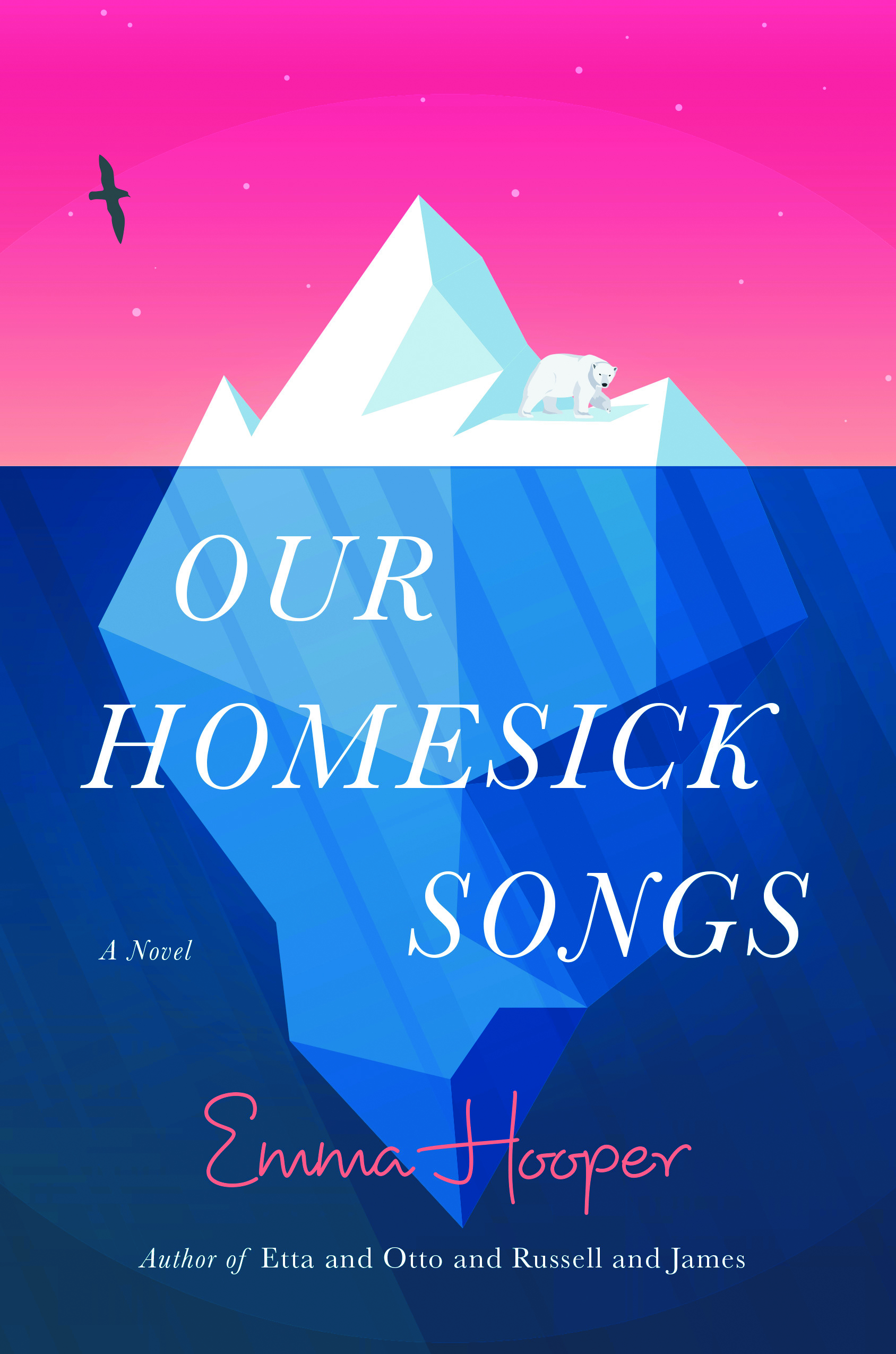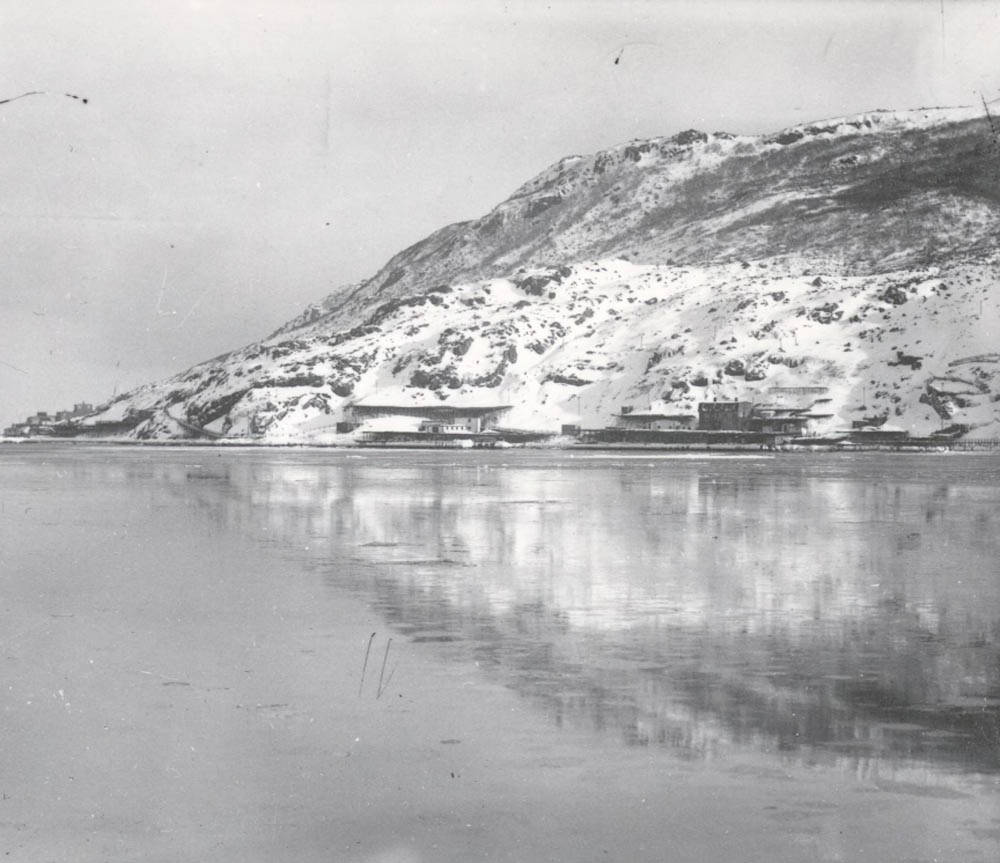Emma Hooper’s Our Homesick Songs
BY Paul Chafe
February 2019

Our Homesick Songs
By Emma Hooper
Penguin $29.95
317 pages
I do see the beauty in Emma Hooper’s Our Homesick Songs, I do. But I have been hearing these sad old tunes my whole life and I am just about ready to throw the accordion into the ocean. Hooper’s tired song of Newfoundland sounds a lot like the one Sandra Gwyn was singing in 1976 when the now defunct magazine Saturday Night published her watershed article, “The Newfoundland Renaissance.” Gwyn writes of “the miraculous and exciting revival of art and theatre on Canada’s poor, bald rock” and claims that this “Newfcult phenomenon” is fueled by failure: “the decline of the fishery, the decay of the old outport way of life, are the sources of [Newfoundland artists’] inspiration and their sense of urgency. The source that drives the green fuse through the flower.” In reaction to the emptying of the outports, the collapse of the fishery, the out-migration of thousands of Islanders, and an unstoppable push toward modernization, Gwyn ensures that the Newfoundland identity does not go gently during this time of change by creating and celebrating primeval Newfoundlanders rooted in the land and defined by loss. In addition to the “Newfoundland mystique” and “collective tragic muse” Gwyn claims these Newfoundlanders carry with them, there is also a paralyzing primitivism.
It is nonetheless a beguiling melody, and almost three decades after the publication of Gwyn’s article, Justin Trudeau picked up the tune when he championed Wayne Johnston’s novel The Colony of Unrequited Dreams for the 2003 edition of CBC’s Canada Reads. In his well-intentioned defense of that book can be heard echoes of Gwyn’s essentialism: Newfoundland is described by Trudeau as a place of “bogs and rocks and caribou and emptiness” — a “barren rock upon which nothing was expected to grow … least of all a people as tragically beautiful and noble as Newfoundlanders.” While this romantic reductionism is not quite the Atlantic Canadian “culture of defeat” then-Conservative leader Stephen Harper derided a year before, it is somehow worse. At least Harper had the sense to label as a failing what he perceived as defeatism — and while he said it would “be hard to overcome,” he still identified this supposed lack of success as something that could be separated from Atlantic Canadian culture and thereby undone. The problem with the conceptualizations of Newfoundland by Gwyn, Trudeau, and now Hooper in her Giller Prize-longlisted novel, is that they sentimentalize this notion of failure and incorporate it inextricably into the Newfoundland psyche and character. Good thing Trudeau was born in Ottawa and not Newfoundland — a tragically noble combatant could never beat the face off Senator Patrick Brazeau.
Fifteen years after Trudeau’s Canada Reads advocacy, Hooper joins in on this unbroken dirge with her story of the Connor family and the fictional (and emptying) Newfoundland village of Big Running. The narrative present of Our Homesick Songs is 1993, one year after the cod moratorium. I am going to be generous here and assume that it is artistic license and not lack of research that leads Hooper to replace the moratorium with the complete, children-of Hamelin-like disappearance of cod (we all know that then-Federal Fisheries Minister John Crosbie “didn’t take the fish from the Goddamn water,” but Hooper does). Such factual details are blurred or ignored in Hooper’s fairy tale version of Newfoundland outport life: a Newfoundland in which people believe in mermaids and that a feather in the pocket prevents drowning. A Newfoundland where ghosts exist, a little boy playing accordion in the barrens attracts caribou, incandescent jellyfish guide sailors to safety, and children can row a boat hundreds of miles to St John’s. Such a fantastic fictionalization of Newfoundland is not inherently problematic – it has been done rather well by Bernard Assiniwi in The Beothuk Saga, Michael Crummey in Galore, Patrick Kavanagh in Gaff Topsails, and most famously by Annie Proulx in her Pulitzer Prize-winning The Shipping News, so I do not normally criticize authors for their fanciful presentations of Newfoundland. Unlike many, I was not offended to the core of my Newfoundland soul by Proulx’s less-than-flattering depiction of Newfoundlanders – it was her prose that drove me crazy (Novel About Newspaper Man Has Headlines for Sentences. Reader Gets It; Grows Tired). But in eschewing some of the realities behind Newfoundland’s fishery and industry, Hooper creates Newfoundlanders defined by loss in general; their tragedy generic, their defeat inherent.

Our Homesick Songs
By Emma Hooper
Penguin $29.95
317 pages
I know it is unfair to expect an author’s fiction to match any perception of reality – I have read my Aristotle: “the function of the poet is not to say what has happened, but to say the kind of thing that would happen.” But I have also read One Flew Over the Cuckoo’s Nest and I remember the heavily-medicated Chief Bromden’s opening caveat: “it’s the truth even if it didn’t happen.” If a story is told often enough, it can become the truth, even if it did not happen, and the danger of Hooper’s story, so connected to loss as a concept, but unhinged from any of the realities behind specific losses, is that it facilitates further the sort of conversation where the only truths about Newfoundland are that it is defeated, destitute and fogbound forever in another time. Just witness some of language used to describe Newfoundland existence in the reviews of Our Homesick Songs: “This delicate elegy for a dying way of life crescendos into a love song binding family members across the waters;” “With stark prose, Hooper captures the desperation and difficulty of life on the edge of civilization while maintaining the foundation of tenderness as her characters take care of one another in the face of near-insurmountable struggle;” “An endangered world aglow with musicality and invention, and a family who braces against loss with charm, humor, and hope.”
She’s gone, b’ys, she’s gone. And it’s hard, hard times. Cue the West Country Lady looking with longing to the ocean. I am not denying that for decades, centuries even, human existence in Newfoundland was one of basic survival, but Hooper and her admirers, through their emotional responses and renderings, are sustaining what Newfoundland historian Jerry Bannister identified years ago as Newfoundland’s “grand narrative of struggle.” It is a narrative so deeply established that it can be maintained without attention to details. All that is needed are Newfoundlanders who are a priori defeated and forever irreparably lessened by that loss. As Bannister puts it, this “single meta-narrative … deliberately blurs the line between the past and the present …. We are not free from our past but trapped by it, forced to endure seemingly endless cycles of economic failure and social misery.” Hooper’s outport Newfoundland of the late-20th century is essentially timeless in that it could be placed at any point on Bannister’s unbroken narrative. What matters is that there is overwhelming struggle and soon to-be overwhelmed noble and beautiful Newfoundlanders. Half a league, half a league, half a league onward.
In Hooper’s novel, as is true with many of the texts that contribute to this “grand narrative,” there is no existence for Newfoundlanders outside Newfoundland. To leave is to fail and enter a limbo worse than death. Cora Connor, eldest child of Martha and Aidan who alternate months working in Alberta and staying at home their children – the sole family remaining in Big Running – runs away to a different part of Alberta midway through the novel and has an encounter with another itinerant Newfoundlander whose identity she has assumed to steal his job as “bear-scarer.” Rather than getting upset, the appropriately-named Don Coffin delivers this eulogy to his fellow “orphan” from Newfoundland: “we come out here looking for new families, new lives, now our old ones are dead, and there are lives here to be had …. There are plenty of lives to be had here, but we know, we always know, we already know, really, that they’re not ours. They won’t be. That’s why I’m so late. I couldn’t bring myself to leave my real, dead, life.” Hooper’s Newfoundlanders are not allowed to innovate or evolve. They are not allowed to move through time or become citizens of the world. Existence off the Island is a half-life, an after-life, a non-existence.
To shift view from the grander themes to the words on the page, Hooper has received much praise for her “stark” and “simple” writing; her “sparse prose that seems borne of the cold and landscape of Newfoundland.” I am a fan of the Papa Hemingway approach, but I am left wondering sometimes if these unadorned phrases are less about choice and more about ability. There are a few sentences here that are real clunkers, especially this one: “From the steps she could almost see down to the water, and, normally, would be able to hear anything like a boat being pulled up or boots on rocks, but today the wind was too erratic, too disordered to hear anything but it.” Sometimes the writing was so sparse that it prevented me from caring about the characters. The overly-accessible prose reminded me of the child-friendly language found in contemporary versions of fairy tales. As a result, I was as invested in Martha and Aidan’s imperilled marriage as I was in Snow White and Prince Charming’s happily ever after.
Still, there are some beautiful moments here, and I can see how others could enjoy this quaint and quirky crew. Cora steals Happy Backpacker Guides from the community’s abandoned library boat to create decorations and convert the abandoned houses of Big Running into England, Mexico, Luxembourg, Tasmania, and other countries in what turns out to be a parting gift to her younger brother, Finn. She then writes secret letters home to her brother by addressing them to the abandoned houses and writing them in the language of the country she foisted upon them. But for the most part, Hooper’s fairy tale is a little too flippant with history and reality to be entertained or excused. In her review of Our Homesick Songs, Jane Urquhart praises paradoxically Hooper’s “authentic sense of place” in her creation of Newfoundland as “a kind of Narnia, or Never-Never Land, a place that we believe in.” The thing is, the children in those stories all leave Narnia and Never-Never Land as they become adults. And while that is a little sad, it is also a celebration of the normal human process of growing into one’s own real, lived life. It is time to stop believing in Never-Newfoundland and mourning its loss. Enough of this childishness. Enough now. Grow up.



